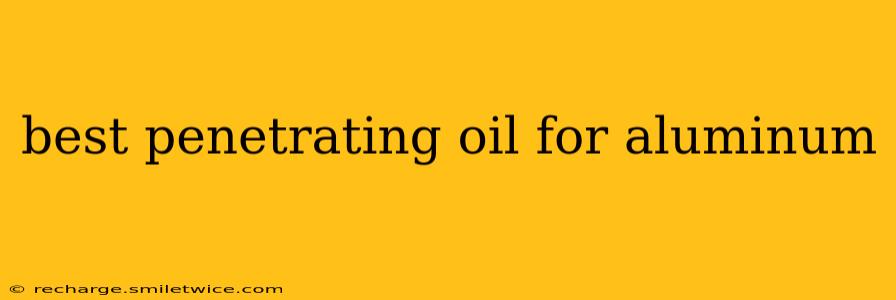Aluminum, a lightweight yet strong metal, is widely used in various applications, from automotive parts to intricate machinery. However, its susceptibility to corrosion and seizing can present challenges during disassembly or repair. Choosing the right penetrating oil is crucial for effectively loosening stuck aluminum components without causing damage. This guide explores the best penetrating oils for aluminum, addressing common questions and providing expert advice.
What Makes a Penetrating Oil Effective on Aluminum?
The effectiveness of a penetrating oil on aluminum depends on several factors. The ideal oil needs to:
- Low Surface Tension: To easily penetrate microscopic gaps between corroded or seized metal parts.
- Solvent Properties: To dissolve rust, dirt, and other contaminants that prevent smooth movement.
- Lubricating Properties: To reduce friction and facilitate the separation of stuck components.
- Compatibility with Aluminum: Some chemicals can react negatively with aluminum, causing damage or discoloration. Therefore, choosing a penetrating oil specifically designed for aluminum or with a neutral pH is crucial.
What are the Different Types of Penetrating Oils?
Penetrating oils typically fall into these categories:
- Petroleum-based: These are commonly available and relatively inexpensive, but they may not be as effective on heavily corroded parts.
- Synthetic-based: Offer superior penetration and lubrication, often outperforming petroleum-based options. They also tend to be less prone to leaving residue.
- Specialty formulations: These are designed for specific applications, such as those containing corrosion inhibitors or additives to enhance performance on particular metals, including aluminum.
What is the Best Penetrating Oil for Aluminum?
There's no single "best" penetrating oil, as the optimal choice depends on the specific application and the severity of the corrosion or seizing. However, highly-rated and frequently recommended options often include those containing:
- Kroil: Known for its exceptional penetrating power and ability to loosen even severely rusted bolts.
- PB Blaster: Another popular choice, effective at loosening stuck parts and displacing moisture.
- Liquid Wrench: A widely available and reasonably priced option that offers good penetration and lubrication.
It's essential to carefully read the product label to ensure compatibility with aluminum and follow the manufacturer's instructions.
Which Penetrating Oil is Best for Removing Seized Aluminum Bolts?
For seized aluminum bolts, a penetrating oil with strong solvent properties and excellent lubricating characteristics is necessary. Synthetic-based oils or specialty formulations designed for rusted and seized parts tend to perform best in these situations. Allow ample time for the oil to penetrate before attempting to remove the bolt. Repeated applications may be needed, especially with heavily corroded or seized components. Gentle heat application can also enhance the effectiveness of the oil.
How Long Should I Let Penetrating Oil Sit on Aluminum Before Trying to Loosen It?
The penetration time depends on several factors, including the severity of the corrosion, the type of penetrating oil used, and the ambient temperature. Generally, allowing the oil to sit for at least 30 minutes, or even overnight, is recommended. For heavily corroded parts, letting the oil soak for several hours or even overnight is often beneficial.
Can I Use WD-40 as a Penetrating Oil for Aluminum?
While WD-40 is a versatile product, it’s primarily a water-displacing lubricant and not designed as a heavy-duty penetrating oil. It might offer some limited help in loosening slightly stuck parts, but it’s not the best choice for heavily corroded or seized aluminum components. For those situations, a dedicated penetrating oil is significantly more effective.
What are the potential risks of using the wrong penetrating oil on aluminum?
Using an inappropriate penetrating oil on aluminum carries several risks. Some oils may contain chemicals that react negatively with aluminum, leading to corrosion or discoloration. Additionally, oils that are too aggressive might damage the delicate threads of aluminum components. Always opt for a penetrating oil that's explicitly labeled as compatible with aluminum or has a neutral pH to mitigate these risks.
Disclaimer: This information is intended for educational purposes only. Always follow the manufacturer's instructions and safety precautions when using penetrating oils. If you are unsure about the best approach for your specific situation, consult a qualified mechanic or professional.
